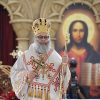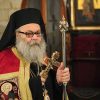“If you want to help us as Christians, to protect us as Christians, you have to find a peaceful solution for Syria and for the Middle East,” John X told Al-Monitor. “You can’t protect me only, if my neighborhood is not well.”
The Damascus-based patriarch was in the United States for last week’s enthronement of a new leader of the church in North America, Metropolitan Joseph. He used the occasion to meet with officials at the UN as well as the White House and State Department.
What follows is an edited, condensed version of his wide-ranging conversation with Al-Monitor during his stay in Washington on Dec. 12:
Metropolitan Joseph has been described as a “son of Damascus” with a particular interest in protecting Christians in the Middle East. Do you foresee the US church playing a greater role in addressing the plight of Christians in the region?
We have a huge archdiocese here, with about 270 parishes, 500 priests and deacons, and nine bishops. We have a lot of hope for the ecclesiastical work this archdiocese can make for all our people to bear witness to Jesus Christ. We are one church, one family and all our people here have roots in Syria or Lebanon or Jordan or Palestine or Iraq and they help spiritually and financially. On the financial side, they send [aid] to the patriarchate to help our people there, in Syria especially these days. There are about 2 million Christians in Syria [and] we have a lot of needs these days. We try to help all without distinguishing between Muslims and Christians — we give to the Muslims and the Christians.
Earlier this year a conference focusing on protecting Christians in the Middle East was held in Washington. Has it had any impact?
We are waiting. We are waiting. We are waiting to see some action. We finished the conference with a communique [urging] the governments [of the world] to find a peaceful solution, a solution through dialogue, not through other kinds of ways — the most important issue is to press all to find a peaceful solution for Syria.
What has been your message in your meetings with US and other officials?
Our message is for peace, how to find a peaceful solution for Syria — that’s the most important thing. And the second is that we as Christians, we are not transients — we are not visitors. We are from these countries, and we live there, and we will still live there. Everywhere we go they ask us, are you remaining in Syria, or Iraq, or Lebanon? It’s a very sensitive and difficult topic. But we believe the solution is not to send war ships or ships for transportation to take us abroad. We ask all the governments to push for peace. If you want to help us as Christians, to protect us as Christians, you have to find a peaceful solution for Syria and for the Middle East. You can’t protect me only, if my neighborhood is not well.
A key aspect of US policy is to empower so-called moderate rebels to help achieve such a political solution. What is your view on this?
We hope to find a peaceful solution through political dialogue, and to cut off all these sources of money and weapons to all these rebels.
You’ve personally been impacted by the violence. Have you had any news of your brother [Paul Yazigi, Metropolitan of the Antiochian Orthodox Archdiocese of Aleppo] and Syriac Orthodox Bishop Mar Gregorios Yohanna Ibrahim, who were kidnapped last year? Have you found out who is responsible?
Unfortunately, we do not have any news. We are afraid because we see this international silence. All [foreign officials] say to us is they do not know anything, unfortunately. It’s a shame for all the world, for all the governments, because they’re speaking about human rights and about democracy, but in this case where is the democracy and where are the human rights? Some governments have information, absolutely, but they don’t give it to us.
How are you counseling other victims of violence? Are you worried about a cycle of sectarian revenge?
We believe the only way to live with the other is in a peaceful way, and to accept the other. We do not believe in extremism or takfirism or this kind of thinking. For these reasons as Christians we try to remain in our homes, in Syria and Lebanon and all the Middle East, and we do not believe that you can use the religion to divide families, to divide brother from brother. For these reasons we have to live in this spirit and to accept the others, to respect the others. We still live this sprit [and] have a very good relationship in our patriarchate with the Muslims.
What kind of support do you need from the US and the rest of the world to achieve peace?
We still hope that we will have a good result and we will find a solution, despite all these catastrophes and tragedy. We still hope. And we still hope that some governments and institutions in the world want truly to find a solution. This encourages us to continue our mission, our work. We live with this hope that after the cross there is the resurrection. We are passing now in a very difficult cross, but we believe in the resurrection. We ask the international community not to think only about their interests in the Middle East — to know that the people of the Middle East is a lovely people, and they seek and ask for peace. And to help us to live all together peacefully.
What are you doing to get across this message that the situation is salvageable?
We try to communicate [how] we try in the patriarchate to help the others, not only the Christians but the Muslims. That is the way we express our mission; that’s what we are, that’s what we believe. It’s very important for the outside world to know this is true. And I think they know.
The Antiochian church is among the oldest Christian churches in the world. What are some of your plans for its future?
The church always has to be alive. And when we say has to be alive, that’s two things: You have roots in the past, your traditions for example, and you have a vision for the future. And you have to connect the past with the future. Now the youth have mobile phones, iPads. We have to change and speak their language. That is not a problem for us, because the truth is the truth. It’s the same content, in a different way. We have a lot of converts — Protestants, Anglicans. They realize they don’t have the true meaning of a lot of things in their life and they find it in the orthodox church, because we have this kind of thinking to connect the past with the future.

















